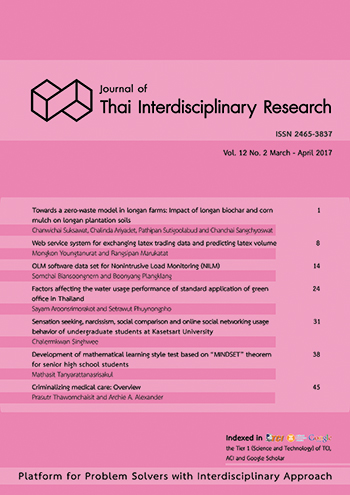Towards a zero-waste model in longan farms: Impact of longan biochar and corn mulch on longan plantation soils
Main Article Content
Abstract
Conventional intensive farming, that focuses on product volume (cash farming), has resulted in large amounts of raw material consumption, especially mineral fertilizers and chemical herbicides that unavoidably affect the environment and consumer safety. In this work, an alternative, sustainable farming practices that focused on improving soil fertility by using in-farm produced longan (Dimocarpus longan Lour) biochar was examined. Biochar, produced from pruning residues, and corn stover compost was studied to evaluate their impact on soil chemical properties and how they might contribute to a “zero-waste” farming model. The farm soil was loamy sand with high acidity and low primary macronutrients (less than optimal for most plants). When different longan-biochar volumes were applied to longan plantation soil, positive effects on some chemical properties were recorded. The highest average soil pH increased at the maximum application rate of 20% v/v biochar by 21.2% (±0.2) and electrical conductivity (EC) increased highest at the biochar application rate of 5.0% v/v by 20% (±6). In addition, SEM/EDX analysis suggested that an exchange of some useful elements between the biochar, the soil and the compost occurred. The use of the in-farm longan biochar not only improved soil condition but also contributed to better environmental and financial outcomes through recycling waste and reducing the need for external fertilizer input.
Article Details
How to Cite
Suksawat, C., Ariyadet, C., Sutigoolabud, P., & Sangchyoswat, C. (2017). Towards a zero-waste model in longan farms: Impact of longan biochar and corn mulch on longan plantation soils. Interdisciplinary Research Review, 12(2), 1–7. https://doi.org/10.14456/jtir.2017.7
Section
Research Articles


